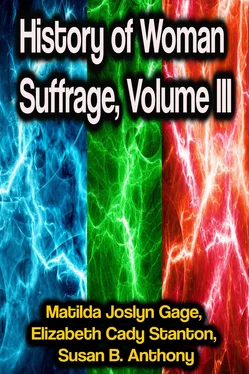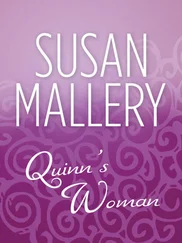The Opera House, in which the National Association held its meeting, was completely filled during all the sessions. The address of welcome was given by Hon. A. J. Poppleton, one of the most distinguished lawyers in that State. He said:
I deem it no light compliment that, in the face of an explicit declaration that I am not in favor of woman suffrage, I have been asked to make, on behalf of the people of Omaha and the State, an address of welcome to the many distinguished men and women whom this occasion has brought together. Doubtless the consideration shown me is a recognition of the fact that I have been a life-long advocate of the advancement of women through the agencies of equality in education, equality in employment, equality in wages, equality in property-rights and personal liberty, in short, a fair, open, equal field in the struggle for life. That I cannot go beyond this and embrace equal suffrage, is due rather to long adherence to the political philosophy of Edmund Burke than any lack of conviction of the absolute equality of men and women in natural rights.
In the winter of 1852-3, when a student at Poughkeepsie, N. Y., while the spot on which we now stand was Indian country as yet untouched by the formative power of national legislation, I listened to Miss Susan B. Anthony, Miss Antoinette Brown and others in the advocacy of the rights of women. It seems a strange fortune that brings now, nearly thirty years after, one of those speakers, crowned with a national reputation, into a State carved out of that Indian country and containing 60,000 people, in advocacy of equal suffrage for her sex. This single fact proclaims in thunder tones the bravery, the fidelity, the devotion of these pioneers of reform, and challenges for them the sympathy, respect, esteem and admiration of every good man and woman in America.
The thirty years commencing about 1850 have been prolific of momentous changes. It is the era of the sewing machine, of the domestication of steam and electricity, the overthrow of the great rebellion, the destruction of slavery, the consolidation of the German empire, the fall of the second Napoleon, the birth of the French republic, the incorporation of India into the British empire, and the revolution of commerce by the Pacific railways and the Suez canal. Great changes have likewise taken place in the structure of our own State and national legislation, the most conspicuous and pronounced result being the centralization of power in the federal government. It has been preëminently a period of amelioration, a long stride in the direction of tolerance of opinion, belief, speech and creed. Hospitals, asylums, schools, colleges and the manifold agencies of an advanced Christian civilization for alleviating the average lot of humanity, have grown and multiplied beyond the experience of former times, and men like Matthew Vassar, George Peabody and John Hopkins have hastened to consecrate the abundant fruits of honorable lives to the exaltation and advancement of the race.
But in no direction have greater changes occurred in this country than in the condition of woman in respect to employment, wages, personal and property rights. In all heathen countries at this hour the mass of women are slaves or worse, wholly deprived of civil rights. In most Christian countries their legal status is one of absolute subordination in person and property to men. In this republic alone have we attained an altitude where some small measure of justice is meted out to women by the laws. In 1850 a fair measure of her rights was the grim edict of the common law holding her in guardianship prior to marriage, and upon marriage making her and all her possessions practically the property of her husband, while a cruel, unreasonable and vicious public opinion excluded her from all except menial and ill-paid service. One by one and year by year these barriers have given way, until in many States her property and personal rights enjoy the complete shelter of the law. Now more than half the occupations and employments of this age of industrial activity and progress are thronged with the faithful, efficient and contented labor of women.
The law has broken forever the thraldom of an odious and hopeless marriage by reasonable laws for divorce for just cause, given her the custody of her children, vested her with the absolute power of disposition and control over her property, inherited or acquired, freed it from the claims of her husband's creditors, and clothed her with ample legal remedies even against her husband. Perhaps Nebraska alone of all the States, by its court of last resort, has upheld the power of the wife to make contracts with her husband and enforce them against him in her own name by the appropriate legal remedies. This surely is progress. Beyond this there lies but one field to win or fortress to reduce. Then surely the worn soldier in the long campaign crowned with the garlands of victory may rest from the battle.
Not many years ago, coming from Wisconsin, I think, a girl presented herself in the Illinois courts for admission to the bar, and after a rigid and unsparing examination she was admitted with public compliment. She took an office in the great city of Chicago and in the short remnant of an uncertain life so wrought in her profession as to attain an average professional income, and win the undivided respect and esteem of her professional associates. And when from a far country, whither she had gone in hope to escape a fell disease, her lifeless corpse was brought back for sepulture, many of the foremost lawyers of Chicago gathered about her bier and bore emphatic testimony to her virtues as a woman and her attainments as a lawyer. To me no greater work has been done by any American woman. When Alta Hulett unobtrusively, silently but indomitably pressed her way to the front of the legal profession, and established herself there, she vindicated the right of her sex to contend for the highest prizes of life, and left her countrywomen a legacy which will ultimately blazon her name imperishably in the history of the advancement of women; and every American woman who, like her, goes to the front of any honorable occupation, employment or profession, and stays there, becomes her coädjutor in work and a sharer in her reward.
Laden with the trophies of thirty years of conflict, of progress, of measurable success, the vice-president of the National Woman Suffrage Association and her associates present themselves to Nebraska and ask a hearing upon the final issue, "Shall this work be crowned by granting to women in this State the highest privilege of the citizen—suffrage?" On behalf of the people of a State whose legislature has granted everything else to women—whose devotion to free speech, untrammeled discussion and an independent press has been conspicuous in its constitutional and legislative history—I welcome them to this city and State, and bespeak for them a patient, candid, respectful, appreciative hearing.
Miss Anthony replied briefly to Mr. Poppleton's eloquent address and returned the thanks of the convention for the courtesy with which its members had been received by the citizens of Omaha.[93] She then read a letter from the president of the convention:
Toulouse, France, September 1, 1882.
To the National Woman Suffrage Association in Convention assembled:
Dear Friends: People never appreciate the magnitude and importance on any step in progress, at the time it is taken, nor the full moral worth of the characters who inspire it, hence it will be in line with the whole history of reform from the beginning if woman's enfranchisement in Nebraska should in many minds seem puerile and premature, and its advocates fanatical and unreasonable. Nevertheless the proposition speaks for itself. A constitutional amendment to crown one-half of the people of a great State with all their civil and political rights, is the most vital question the citizens of Nebraska have ever been called on to consider; and the fact cannot be gainsaid that some of the purest and ablest women America can boast, are now in the State advocating the measure.
Читать дальше












